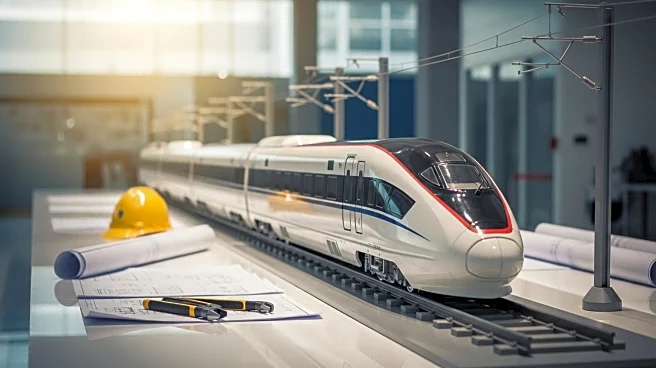What is the story about?
What's Happening?
Vietnam is advancing plans to develop a highly skilled workforce to support the expansion of its rail network, including the North-South high-speed line. The Ministry of Construction has drafted a comprehensive project aimed at training railway personnel through 2030, with a vision extending to 2045. The government has approved nine new railway routes and upgrades to seven existing lines, along with plans for 28 urban railways in Hanoi and Ho Chi Minh City, totaling over 1,100km by 2045. The initiative seeks to address the skills gap in the railway sector, which currently relies heavily on foreign expertise for locomotive design, rolling stock manufacturing, and other technological capacities. The project aims to train over 140,000 workers by 2045, focusing on high-speed rail, electrified lines, and urban metro systems.
Why It's Important?
The development of a skilled workforce is crucial for Vietnam's railway sector to reduce dependency on foreign expertise and advance technological capabilities. This initiative is significant for the country's industrialization and modernization efforts, enhancing regional connectivity and economic growth. By investing in workforce training, Vietnam aims to master technology and foster homegrown innovation, which could lead to increased self-sufficiency in railway operations. The project also emphasizes the importance of public-private partnerships and international cooperation to mobilize resources and facilitate technology transfer, potentially positioning Vietnam as a competitive player in the global railway industry.
What's Next?
The project outlines several tasks and solutions, including creating incentives to attract skilled workers and fostering cooperation between universities, enterprises, and government agencies. Training programs will be aligned with the demands of major projects, and investment in training institutions will be expanded. The initiative also calls for public-private partnerships and international cooperation to enhance workforce development. Funding sources will include investment budgets for railway projects, state budgets for government officials' training, and contributions from enterprises and learners. Authorities aim to draw on international assistance from development partners and railway powers experienced in high-speed systems.
Beyond the Headlines
The project highlights the need for Vietnam to build institutional capacity alongside technical skills, ensuring the railway industry becomes an attractive career destination. By reducing reliance on foreign expertise, Vietnam could strengthen its position in the global railway sector and foster long-term economic growth. The initiative also underscores the importance of aligning training programs with industry demands, which could lead to more efficient and effective railway operations.















